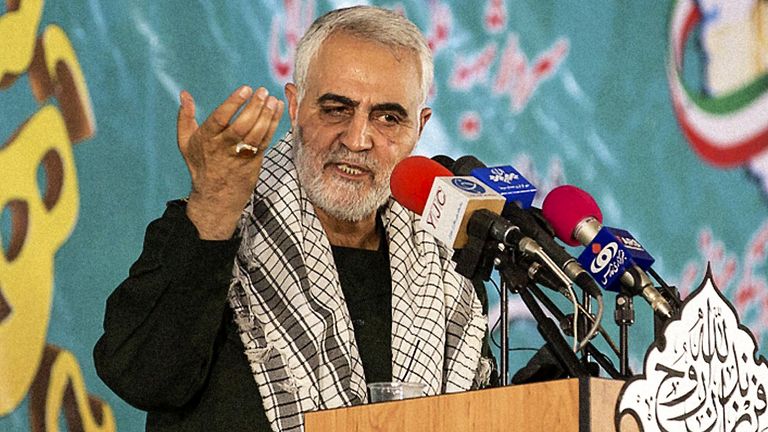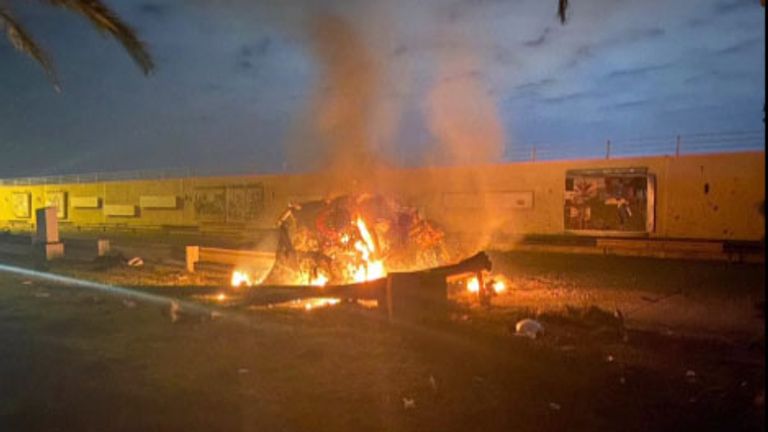
Major General Qassem Soleimani, the architect of Iran's intelligence and military operations abroad, was hailed as a hero at home and considered one of the most powerful figures in the country.
The commander of the elite Quds Force of the Revolutionary Guards was killed in a US air strike on his convoy at Baghdad airport.
Maj Gen Soleimani, 62, is understood to have directly reported to Ali Khamenei, Iran's Supreme Leader.
Outside of domestic affairs, controlled by President Hassan Rouhani, the major general was seen as the second most powerful person in the country. Commentators have compared his status to that of the US vice president.
He had been spearheading Iran's growing military influence in the Middle East. His movements were closely watched by the United States, Israel and Saudi Arabia. The force he led could be compared to a combination of America's CIA and special forces.
The US believes he was behind attacks on American forces in the region for the past two decades. Last year, it designated the Revolutionary Guards as a foreign terrorist organisation.
In 2018, Soleimani was seen in a video clip warning the US president: "I'm telling you Mr Trump the gambler, I'm telling you, know that we are close to you in that place you don't think we are. You will start the war but we will end it."

In recent years Soleimani deployed his forces in Syria's war to support President Bashar al Assad. He was also seen on battlefields, guiding Iraqi Shia groups in the war against Islamic State.
Here are some of the main details of his life and career:
- Soleimani was born into an agricultural family in the town of Rabor in southeast Iran on 11 March 1957, going on to work in construction aged 13 and then for a city water department
- When the revolution to oust the Shah of Iran began in 1978, Soleimani organised demonstrations against the monarch
- He joined the Revolutionary Guards shortly after it was formed in 1979
- Gaining a reputation for bravery, Soleimani rose through the ranks during the war with Iraq which broke out in 1980. Known as the Sacred Defence, the war lasted until 1988 and left as many as a million people dead.
- He became head of the Quds Force in 1998
- In 2007, at the height of the civil war between Sunni and Shia militants in Iraq, the US military accused Soleimani's Quds Force of supplying improvised explosive devices to Shia fighters, leading to the deaths of scores of American soldiers
- He and the overall head of US forces in Iraq at the time, General David Petraeus, were in communcation. Gen Petraeus in 2010 recalled one message from the major general: "You should know that I, Qassem Soleimani, control the policy for Iran with respect to Iraq, Lebanon, Gaza and Afghanistan."
- Soleimani was frequently described as quiet and inconspicuous; a 2013 New Yorker profile quoted a former CIA officer in Iraq, John Maguire, as saying: "Soleimani is the single most powerful operative in the Middle East today... and no one's ever heard of him."
- In summer 2015 he visited Moscow in what was said to be the first step in planning for Russia's military intervention to support President al Assad, a move that reshaped the Syrian civil war
- Soleimani frequently travelled into Syria, reportedly compiling his own international team of officers to work out of a bland but heavily fortified building in Damascus. This led to a notable increase in Iranian supplies into the country
- The US Treasury sanctioned him for the Quds Force's support for Hezbollah in Lebanon and other armed groups, and for his role in Syria's crackdown against protesters
- Soleimani is alleged to have been involved in a plot to assassinate the Saudi ambassador to the United States.
- Before Friday's attack, he was rumoured to have been killed a number of times - and was believed to have survived assassination attempts
- He was pictured not wearing flak jackets in war zones and out of uniform, taken as a sign of his lack of fear of death
- Ayatollah Khamenei awarded him the Order of Zolfiqar medal, Iran's highest military honour, last year

No comments:
Post a Comment